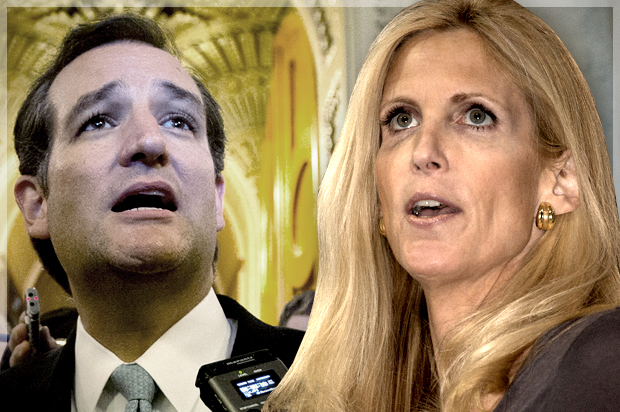If you’ve seen any news about the Affordable Care Act recently, chances are excellent it’s had something to do with Jonathan Gruber. The MIT economist and one-time White House healthcare consultant became a bona fide right-wing media star last week after videos turned up of him saying the Affordable Care Act was “written in a tortured way,” and that “the stupidity of the American voter” was “really, really critical” to its passage. In Gruber’s impolitic remarks, conservatives had found confirmation of everything they already believed about the ACA: that it’s one big fraud, that President Obama and the Democrats lied to America, and that it should be nuked from orbit as soon as is feasible.
Of course, they’ve been saying that for over four years now, so this new round of Obamacare hatred, spirited as it may be, isn’t all that interesting. As for Grubergate, I’ve paid little attention to the story mainly because I don’t think it matters all that much. Gruber’s assessment of the legislative process spoke to some cynical truths about how bills are written in ways that game the various scorekeepers and mask unpleasant facts. If all you conservatives out there want to flex your outrage muscles over this, by all means do. All I’d ask is that the next time a Republican budget comes along that promises to slash tax rates, balloon defense spending, and achieve balance in 10 years, please do remember the name of Gruber.
But as much as conservatives want Grubergate to be a story about the Affordable Care Act, it’s more about the politics of Obamacare. Gruber is a living caricature of the elitist liberal technocrat that conservatives love to hate. His “stupid” comments are an embarrassment for Democrats, and the reason conservatives are so excited about them is that they get to travel back in time to 2010 and relitigate the passage of the unpopular Republican punching-bag that is the Affordable Care Act. It also allows them to indulge in the fiction that the law was “rammed through” without any real debate. But at the end of the day, as rude and provocative as he might have been, Gruber didn’t say anything we didn’t already know.
Stories like Grubergate get so much attention because coverage of the Affordable Care Act continues to focus on how the law fares politically, and pays far too little attention to how the law actually functions. And even to the extent that the law’s real-world impacts are covered, the dominant political narrative – that of an unpopular law that drags Democrats down like a millstone – makes it more likely that the ACA’s setbacks get more attention than its successes. And that’s unfortunate because the law, as many have pointed out and will continue to point out as long as is necessary, is working.
The second open enrollment period for the law began on Saturday, and (contrary to the doom-and-gloom predictions of many conservative critics) the number of insurers offering plans on the exchanges increased dramatically from last year. More companies offering more plans means more competition, and that means for the first time in as long as anyone can remember, health insurance premiums aren’t expected to spike. In major cities across the country, premiums are either barely rising or slightly decreasing.
“Decreases in the price of health insurance are basically unheard-of,” reports the New York Times. “The individual insurance market that these new marketplaces replaced experienced annual increases of 10 percent in recent years. In the employer market, premiums went up by a record-low rate of 3 percent this year, but even that increase can’t compare with what’s happening in many exchange markets.”
Is this freeze in premiums across the board? Absolutely not. The data, as noted, is for major urban centers. Rural areas, where competition is less intense, are far more susceptible to rate increases. But even that problem is being tackled by enterprising state governments. Colorado began tinkering with the geographic rating areas used by insurers to set prices, and by consolidating the rural areas the state managed to boost competition and decrease average premiums for rural residents. A real-life laboratory of democracy. Imagine that.
As for the people actually purchasing the insurance, they seem pretty happy. A recent Gallup survey found that over 70 percent of people who purchased coverage through Obamacare exchanges said the quality of their coverage and the quality of their healthcare was “excellent” or “good.” Of the people who were newly insured this year, 75 percent said they satisfied with the cost of their coverage. “As the healthcare exchanges reopen on Nov. 15,” Gallup’s analysis concluded, “these data suggest that the currently uninsured will mostly be pleased with the outcome if they opt to use the exchanges to obtain insurance on this second go-around.” As for those selfsame uninsured, a separate Gallup survey found that 55 percent intended to purchase insurance.
Again, none of this is to say that the law is perfect or that it’s having its anticipated effect in every state. There are 51 different insurance markets and exchanges, and certain states have been more hostile to healthcare reform than others, which leads to divergent outcomes. Conservatives eagerly seize on what bad news they can to paint the law as an ongoing “disaster.” But overall the Affordable Care Act is accomplishing much of what was originally intended. That, more than anything, is why this orgy of Gruber outrage just doesn’t seem all that important.

